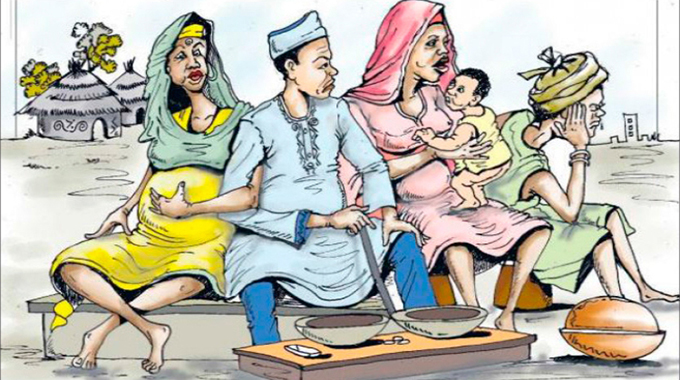A feast for the bush ants
these constructs and imaginings, it is important to keep in mind the central image of our history, the village.
As we grow big in stature, social, political and professional positions, let us not forget the village.
Of course, many of us remember one or two funny days from our primary school days and shock ourselves when we reflect.
This villager reflects on one of those days at a school, back in the village.
It was at dawn. The month of June was very cold. In fact, it was silly cold. A hard but cold morning breeze wafted westwards from the direction of Dande River, sending tree leaves and the tinder dry grass swinging and singing.
Grandmother had just awakened the three of us to prepare for school. The school was five kilometres away. With the lethargy of sleep, we were yawning, slow moving, rubbing eyes with the backs of our hands and scratching all over the bodies. Such is the process of shaking off the lethargy of slumber.
Grandmother urged us to hurry up, while she cleaned the hearth and started the fire.
Within minutes and suddenly, the 6am school bell rang from a distance, “ngo, ngo . . . ngo, ngo . . . ngo, ngo!” accosting, between each ngo, ngo . . . was the Hail Mary Mother of Jesus prayer. So we went along: “Kaziwai Maria . . . amai vaMwari . . . makakomborerwa pavakadzi . . . mambo anemi . . .” Reciting was mandatory, yet it also signalled that it was time to prepare to go to school.
The village was never a good place for early years in school. The school was five kilometres away. We reluctantly took to bathing in the cold, face and legs only for Vaseline Blue Seal did the rest of the job. The only problem was, with too much Vaseline, dust caked on the legs and especially the feet.
My other two cousins did not even have shoes and in the spirit of family unity, grandmother barred me from wearing my canvas tennis shoes, the Tender Foot, so that we looked equal.
Soon we were dressed up. The uniforms either torn here and there or ill-fitting. If my memory serves me right, I looked like a dwarf in a giant’s rob. Takesure was in Grade Four and had outgrown his uniform. Francis had problems with his shorts. He was in Grade Two, with me. We had to go to school, though. There were children in worse of scenarios than us.
That morning we had non-sugared baobab fruit porridge. There was little sugar left in the home. It was steaming hot and we systematically blew air from our mouths to cool it off. We intermittently stirred and spread the hot porridge on the interior eaves of the plate, blew air from the mouth, ate, ate and ate. Repeated. Ate, ate, and ate. Repeated!
Baobab fruit porridge was never eaten for the taste buds but for the stomach, grandmother emphasised each time. The mouth was just an entry point for food, if the food tasted good, then we were lucky to have that coincidence. The stomach . . . the stomach . . . the stomach and only the stomach mattered.
So to mop up, we dropped the spoons, skillfully bended the forefingers into a hook position and turned them round and round the eaves of the plates, and scooping everything into the mouth. We left the plates almost clean, so much that grandmother was left with little, if anything to clean.
The small radio shrieked from the corner and there was one particular advertisement that told the story. It started at exactly 6.45 am. “Jarzin, J-A-R-Z-I-N, Jarzin Supermarket!” Once you heard that, it was time to trot to school.
The norm was to carry food for breakfast and lunch, what is euphemistically known as tuckie these days. We were given sweet beer (mahewu) in a 750ml bottle of cooking oil, each and for the first time in several weeks, it was sugared. Grandmother used sugar sparingly. It was a rare spectacle for a poor family. We cherished the day we got sugared mahewu. Most of time there was no sugar in the house. Sugar was a scarce.
We took off to school and made a beeline to Muzika School with other children from Nhamoyebonde Village. Along the way we were joined by other children from Muzika Village and the number grew bigger as we went towards the school. Each child had his/her tuckie.
It was quite a variety from monkey oranges (matamba or hwakwa), wild tree bubble gum (matohwe) to boiled maize grain, (mangayi) up to home backed bread (chikodzamvana), among others. The containers were mainly plastic bags emptied of sugar and hence were transparent. Whoever had the best food bragged about it.
Between Muzika Village and the school, was a vast swath of stunted dense bush shrubbery that shared a boundary with the school’s gum tree plantation. Between the bush and the plantation one would choose where to hide the tuckie.
This particular day I chose a Msasa tree bush and hid my bottle of sweet beer. The school bell rang and it was time to run fast for assembly. You needed to place it an angle where no one would find it or you were finished. There were rogue school dropouts, who specialised in sniffing for children’s tuckies, while others were in school.
On arrival at school, it was huff and puff for all latecomers. The headmaster, a Mr Kazado, was no nonsense man. He was a strict disciplinarian, who stood by the gate and whipped, flogged and canned latecomers, almost daily.
At break, the school exploded in cacophony of shifting of desk and chairs as children poured out to play. Boys played paper ball. Sporadic fistfights erupted, here and there.
On the other side girls played boxes, uniforms tucked in the seams of their panties. Hobbling and hoping on one leg, forwards and backwards. Sideways. Forwards, forwards, forwards and backwards, then sideways. Stop. Jump. Stop. Quarrel. Start.
The break time was short and it was time for lessons again. At noon, the lower grades dismissed. It was now time to feed ourselves amid fistfights and soccer matches on our way back home.
As was the norm, one would simply sneak out of the group, pick up his or her food or drink from the hideout. It was my turn. I had marked my hideout through a dead tree, so I did not get lost. There I was, salivating but lo and behold, ants were having a field day. The bottle had exploded from fermentation and the heat. I cried. It was a big loss. One of those few days I had sugared sweet beer. I looked back, shook my head with disbelief. Walked off a bit and looked back one more time, but the ants continued feasting as if nothing had happened. I walked off forever, hungry.
The day a monkey is scheduled to die, it finds all trees slippery with dogs in hot pursuit, do they not say that? Sad, stomach rumbling from desire and throat drying up, I joined the other children in a slow trickle back home.
Back home grandmother could not hear of it. To her I was stupid, wasteful and irresponsible. I needed to choose carefully my hideout next time. All the same, there was still sweet beer in the calabash, but there was no more sugar. It was food and drink.
Thereafter it was time to change uniform and go looking for cattle. From the beginning of May up to around mid-November cattle were allowed to roam and only closed up at night.
That time cattle would go up to 10km away and you needed a cultured ear to capture distant cattle bells. You also needed a trained ear to pick up the tune of your particular bell.
After closing up the cattle, it was evening and time for stories that snorted us into sleep. But I never forgot my sweet beer and the cruelty of science and nature. Fermentation, fermentation, fermentation! The feast of the ants . . .








Comments